Understanding Mortuary Science Compensation: What Professionals Earn
The average mortuary science salary in the United States ranges from $40,000 to $130,000 annually, depending on role, experience, location, and employer type.
Quick Mortuary Science Salary Overview:
- Median Mortician Salary: $57,406 per year
- Total Compensation Range: $70,000-$131,000 (including bonuses)
- Entry-Level Positions: $36,000-$48,000
- Experienced Professionals: Up to $77,000 base salary
- Highest Paying State: Connecticut ($110,400 average)
- Government Sector: Highest industry average at $72,553
The field of mortuary science offers stable employment with moderate growth potential and meaningful work helping families through difficult times. While the profession requires specialized education and licensing, it provides a career path with advancement opportunities and reliable demand regardless of economic conditions.
Behind the salary figures lies a profession that demands both technical expertise and profound empathy. Mortuary science professionals must master embalming techniques, understand legal requirements, and develop strong interpersonal skills to guide grieving families. The compensation reflects this unique combination of scientific knowledge and emotional labor.
I'm Mortuary Cooler, a national-level mortuary equipment supplier with extensive experience working with funeral professionals across the country and observing how mortuary science salary trends impact equipment purchasing decisions and operational planning for funeral homes. Unlike many broader funeral equipment manufacturers that produce everything from prep-room tools to casket lifts, we specialize exclusively in high-quality mortuary coolers designed for optimal performance and reliability.
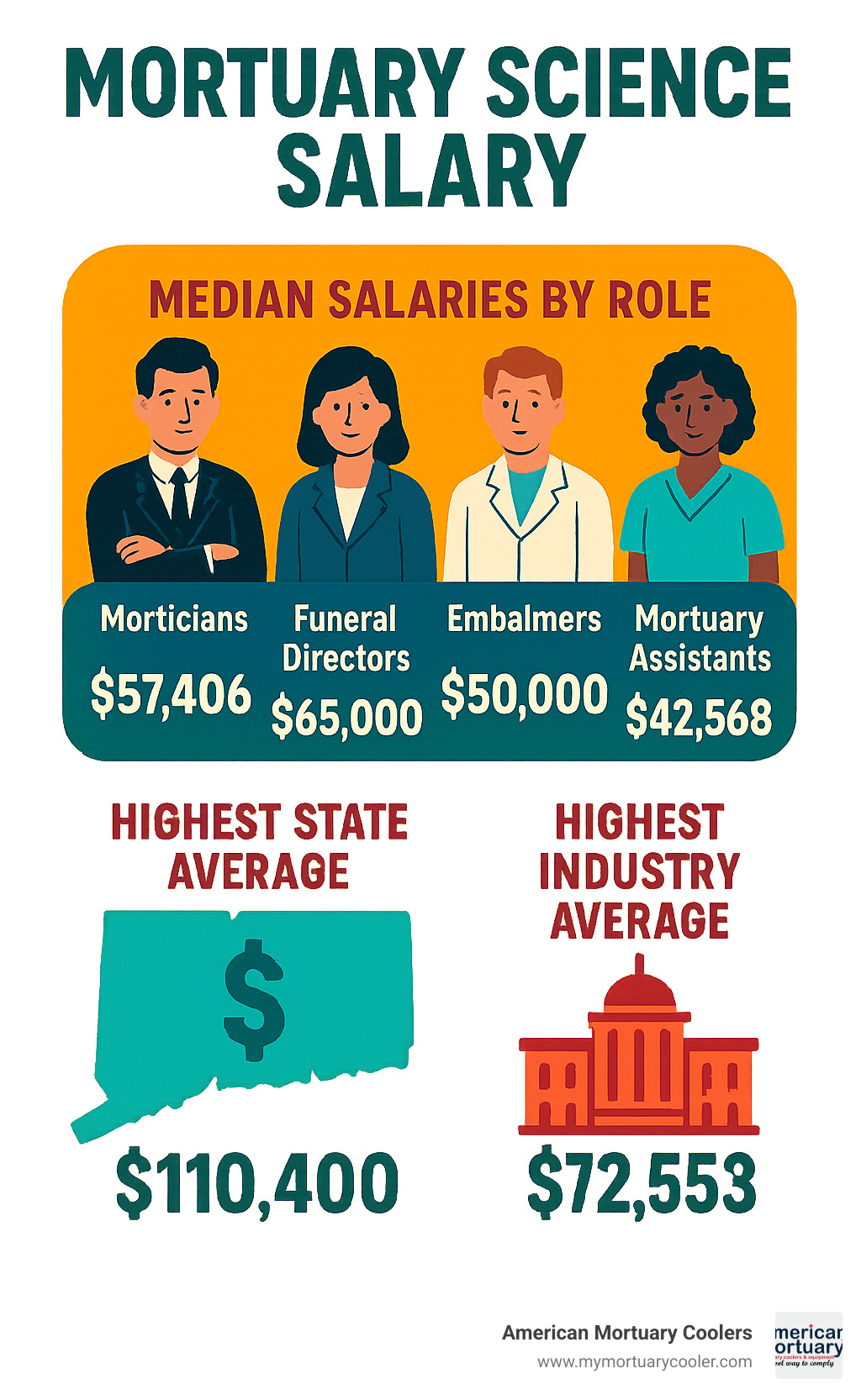
Mortuary science salary helpful reading:
Mortuary Science Salary Overview in 2025
Let's take a look at what mortuary professionals are actually earning in 2025. I've talked with hundreds of funeral directors across the country, and while the numbers vary widely, there are some clear patterns emerging.
| Role | Median Annual Salary | 25th-75th Percentile | Total Compensation (with bonuses) |
|---|---|---|---|
| Mortician | $57,406 | $40,000-$77,000 | $70,000-$131,000 |
| Funeral Director | $65,000 | $45,000-$85,000 | $75,000-$140,000 |
| Embalmer | $50,000 | $38,000-$65,000 | $55,000-$90,000 |
| Mortuary Assistant | $42,568 | $36,352-$51,729 | $45,000-$60,000 |
When we look at the national average mortuary science salary across all positions, it comes in at about $40,313 yearly (or $19.38 hourly). But honestly, that number doesn't tell the whole story. The range is quite broad depending on whether you're just starting out or running your own funeral home.
The Bureau of Labor Statistics projects about 4% growth in our field over the next decade. While that's a bit below the 7% average for all occupations, there's something comforting about working in a profession that remains steady regardless of economic ups and downs.
One thing to keep in mind: your salary's actual value depends heavily on where you live. A mortuary science salary of $60,000 goes much further in small-town Tennessee than in downtown San Francisco. When considering job offers, always factor in the local cost of living.
Those who've invested in a Bachelor of Science in Mortuary Science typically command higher salaries%2CMortuaryScience/Salary) than colleagues with associate degrees, reflecting the additional education and expertise they bring to the table.
Average mortuary science salary at a glance
The median mortuary science salary sits at $57,406 – meaning half of professionals earn more, half earn less. But base salary is just the beginning of the compensation story.
When you factor in the full compensation package including bonuses and other incentives, mortuary professionals can take home up to $93,236 annually. That extra $16,063 beyond base salary typically comes from:
Performance bonuses ranging from $495 to $6,000, profit-sharing opportunities worth $983 to $3,000, and commissions that can add anywhere from $500 to a substantial $20,000 to your annual income.
These additional earnings are particularly common in privately-owned funeral homes and corporate chains. In contrast, government positions often offer higher starting salaries but with more standardized pay structures and fewer performance incentives.
I've noticed while working with funeral homes across the country that the most successful professionals find ways to maximize both their base salary and these additional compensation opportunities. Whether through continuing education, specialization, or exceptional client service, there are multiple paths to increasing your earning potential in this stable, meaningful profession.
Job Title & Experience Impact on Mortuary Science Salary
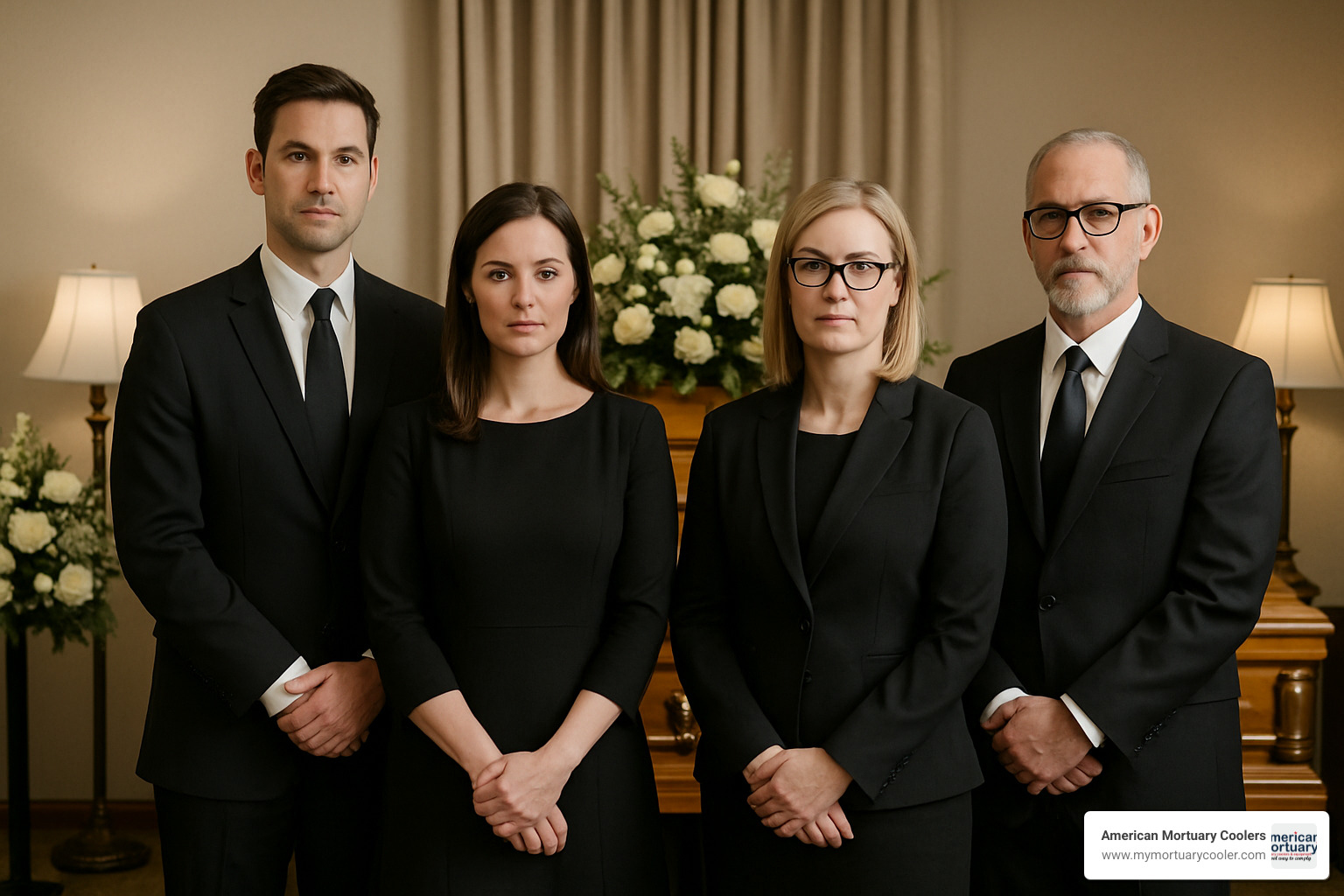
When it comes to earning potential in the funeral service industry, your job title and years of experience play crucial roles in determining your paycheck. The field offers a clear career ladder where each rung represents not just more responsibility, but also a meaningful bump in your mortuary science salary.
Average mortuary science salary by role
Let's peek behind the curtain at what different funeral professionals typically earn:
Morticians bring home around $57,406 annually. They're often the compassionate faces families remember, balancing technical skills with the gentle art of guiding people through grief. Their unique ability to handle both the science of preservation and the human element of care is reflected in their mid-range compensation.
Funeral Directors earn a higher average of $65,000 yearly. Think of them as the conductors of the funeral orchestra – coordinating staff, managing facilities, and ensuring every service runs smoothly. Their premium pay comes from taking on the business side of death care, often requiring both technical knowledge and management skills.
Embalmers typically earn about $50,000 per year. These specialized professionals focus on the technical and artistic aspects of preparing the deceased. While they might work behind the scenes, their expertise in anatomy, chemistry, and restorative techniques is absolutely essential to providing families with meaningful final viewings.
Mortuary Assistants start at around $42,568 annually. These entry-level positions are where many careers begin, with responsibilities ranging from transportation to facility preparation. While the pay is modest, these roles provide invaluable hands-on experience that paves the way for advancement.
How experience shapes your mortuary science salary
Just like a fine wine, a career in mortuary science tends to become more valuable with age. Your mortuary science salary evolves significantly as you gain experience:
Fresh graduates with less than a year of experience typically start around $48,796 in total compensation. Those early-career professionals with 1-4 years under their belts see a modest bump to about $49,743.
The middle years (5-9 years of experience) bring steady annual increases of 3-5%, while veterans with 20+ years in the field command salaries about 9% higher than the median. That experience premium makes sense – they've literally seen it all.
Leadership positions come with substantial financial rewards. Managing a funeral home or overseeing multiple locations can boost your earnings by 10-15% compared to non-management roles. Even supervising a small team of junior staff can positively impact your compensation.
The reality for many professionals, especially in smaller communities, is wearing multiple hats daily. You might embalm in the morning, handle paperwork at lunch, and meet with families in the afternoon. While this juggling act doesn't always translate to immediate higher pay, it builds a versatile skill set that makes you incredibly valuable as your career progresses.
This career path offers something increasingly rare in today's economy – predictable advancement with reliable salary growth. From internship to ownership, each step brings not just better compensation, but deeper connections to the communities you serve.
Location, Gender & Employer Type: What Moves the Pay Needle
Where you work makes a huge difference in your mortuary science salary – and I'm not just talking about which funeral home you choose. Your state, city, and even the type of organization you work for can dramatically shift your earning potential.
Having worked with funeral homes across the country, we've seen how location impacts what professionals earn. If you're looking to maximize your income, consider Connecticut, where mortuary professionals enjoy an impressive average salary of $110,400. The District of Columbia also offers strong compensation, with mortuary assistants earning around $47,378, while California embalmers can expect about $48,620.
City dwellers typically earn more, though they face higher living costs. San Jose leads the pack with mortuary assistants earning $53,422 on average. San Francisco and Philadelphia follow closely behind, with mortuary science graduates taking home approximately $44,663 and $44,420 respectively.
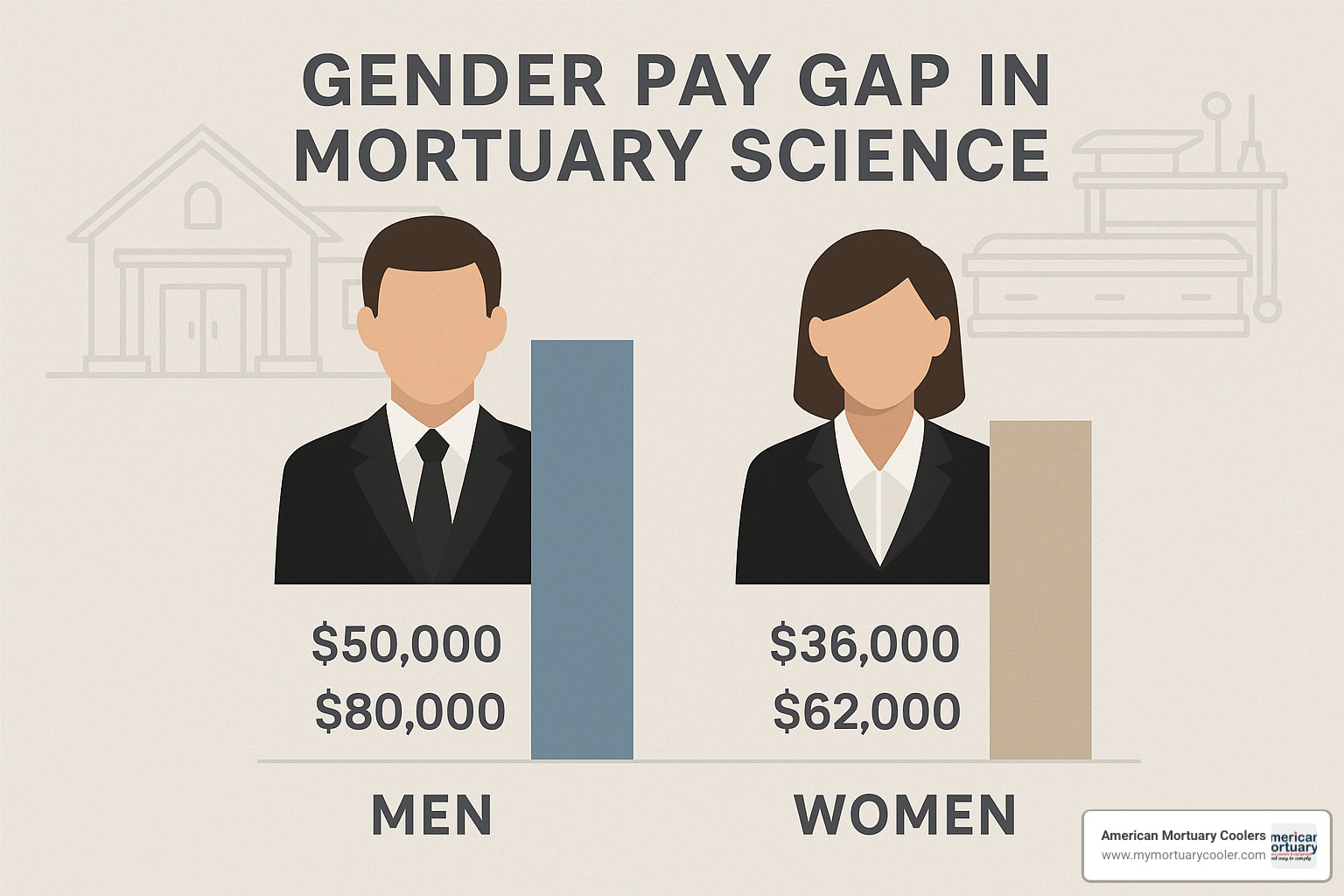
Who signs your paycheck matters almost as much as where you live. Government positions offer the most generous mortuary science salary packages, averaging $72,553 annually. Educational institutions come in second at $54,307. Private funeral homes and corporate chains show greater variation – with corporations often providing clearer advancement paths but sometimes less flexibility than family-owned businesses where you might wear multiple hats.
Perhaps the most troubling aspect of compensation in our field is the persistent gender pay gap. Despite women now making up nearly 73% of morticians, they earn substantially less than their male counterparts. Male mortuary science graduates typically earn between $50,000-$80,000, while women with identical qualifications receive just $36,000-$62,000. This disparity exists across all experience levels and regions.
This gap is particularly disappointing in a profession that has transformed from male-dominated to female-majority over recent decades. The skills haven't changed, but somehow the compensation hasn't equalized. For those interested in exploring specific role compensation in detail, resources like Mortuary Assistant Salary in the United States provide valuable insights.
At American Mortuary Coolers, we've observed these regional and employer-type differences through our work with diverse funeral establishments – from our Tennessee headquarters to our service areas spanning the Northeast, Southeast, Midwest, and Western regions. These salary variations often influence how funeral homes approach their equipment investments and operational planning.
Boosting Your Mortuary Science Salary: Education, Certifications & Career Paths
Looking to increase your earning potential in the mortuary science field? You're not alone. Many professionals in our industry wonder how they can take their careers—and their paychecks—to the next level. As we've worked with funeral homes across the country supplying mortuary coolers, we've noticed clear patterns in who earns more and why.
How to increase your mortuary science salary
That associate degree might have gotten you in the door, but pursuing a bachelor's degree in mortuary science could boost your earnings by 10-15%. It's not just about the diploma hanging on your wall—it's the additional knowledge in business management, psychology, and advanced techniques that make you more valuable to employers.
Certifications can also significantly impact your bottom line. Becoming a Certified Crematory Operator (CCO) opens doors as cremation rates continue to rise nationwide. Similarly, earning your Certified Funeral Service Practitioner (CFSP) credential demonstrates your commitment to excellence. We've noticed funeral homes often prioritize these credentials when making hiring and promotion decisions.
"When I added grief counseling certification to my resume, I was able to negotiate a $7,000 salary increase," shared one funeral director we work with in the Midwest. "Families appreciate having someone who can truly support them through the grieving process."
The typical career path in our field follows a natural progression. You might start as a mortuary assistant earning around $36,000-$48,000, then advance to a licensed position making $45,000-$65,000. Management roles can push your mortuary science salary into the $60,000-$85,000 range, while ownership stakes can potentially exceed $150,000 annually.
Sometimes the fastest way to increase your earnings is simply changing employers. We've supplied equipment to many funeral professionals who boosted their income by 10-20% by making a strategic move to a new funeral home. This approach works especially well when you bring valuable experience or client relationships with you.
Don't overlook the potential of shift differentials and on-call pay. Death doesn't follow a 9-to-5 schedule, and your willingness to be available during evenings, weekends, and holidays can substantially increase your total compensation. Some funeral homes offer premiums of 15-25% for these less desirable shifts.
For those with entrepreneurial spirits, profit sharing and ownership represent the highest earning potential. While this path comes with additional responsibilities and financial risks, it also offers the greatest rewards. Many successful funeral directors eventually become partners or owners, controlling not just their career but their financial destiny as well.
If you're balancing work while wanting to advance your education, you're in luck. You can Explore Affordable Online Funeral Director Programs that accommodate working professionals. These flexible programs allow you to improve your credentials without putting your career on hold.
In our industry, your value goes beyond technical skills. The ability to connect with families during their most vulnerable moments, coupled with business acumen and specialized knowledge, creates the perfect formula for career advancement and salary growth. By strategically investing in your professional development, you're positioning yourself for both personal fulfillment and financial success in this meaningful career.
Challenges, Benefits & Job Outlook
Let's be honest - mortuary science isn't for everyone. The profession comes with unique challenges that directly shape both compensation packages and overall job satisfaction.
Working in this field often means saying goodbye to predictable 9-to-5 schedules. Death doesn't follow a convenient timetable, which means you'll likely face on-call rotations and need to respond to families' needs at all hours. This unpredictability is typically reflected in compensation structures, with many professionals receiving on-call pay or shift differentials.
The emotional labor involved is substantial. You'll guide families through their worst days, requiring extraordinary empathy while maintaining professional composure. This emotional toll is real, though many professionals cite it as both a challenge and the most meaningful aspect of their work.
There are physical demands too - from the lifting and positioning required during preparation to the extended periods standing during visitations and services. And yes, there's exposure to embalming chemicals and other potential health hazards, though modern preparation rooms (like those equipped with quality ventilation systems) have significantly reduced these risks.
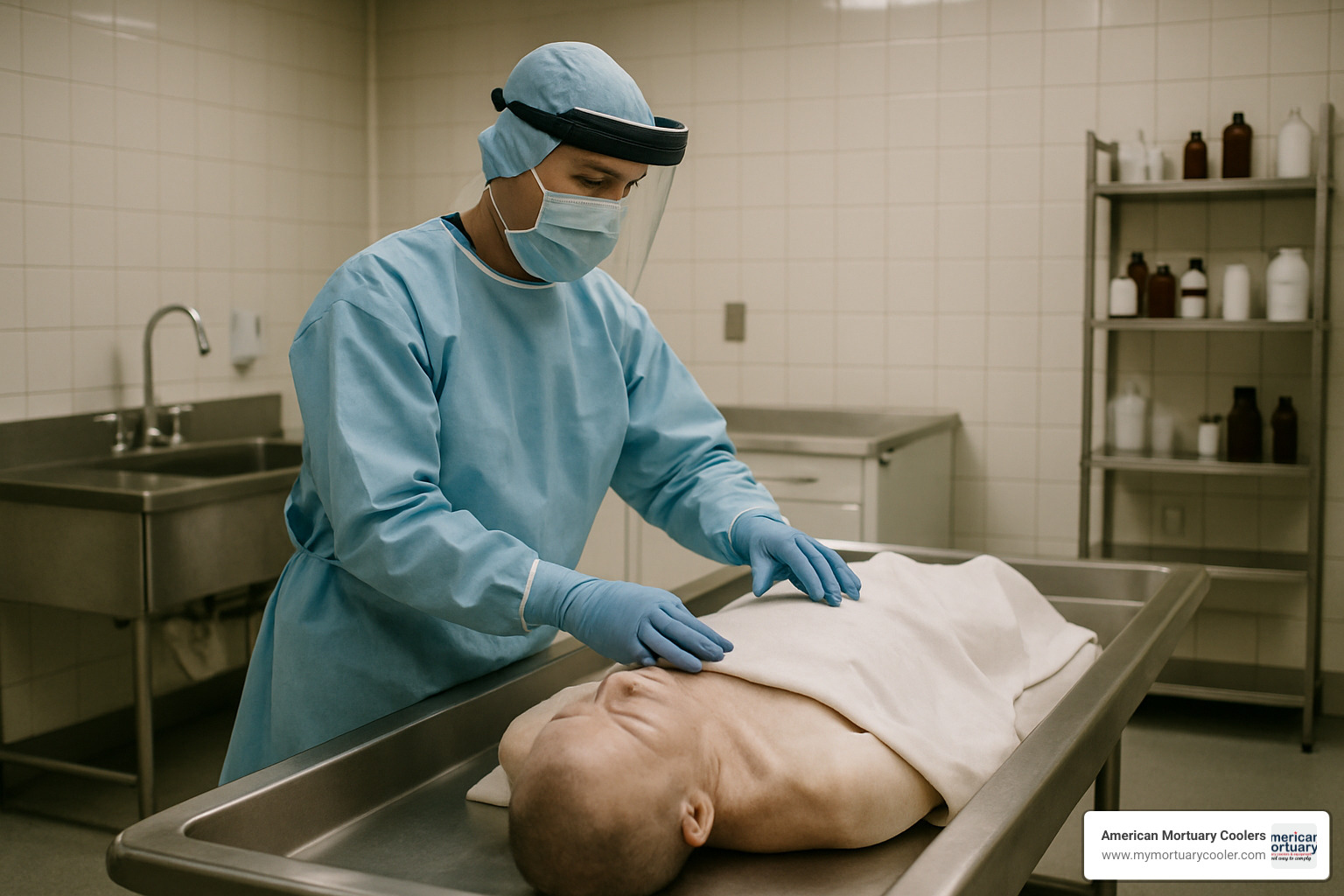
Yet despite these challenges, mortuary science offers meaningful rewards that go well beyond your mortuary science salary. There's profound job security - funeral services remain essential regardless of economic conditions. The sense of purpose is immense, with professionals often describing the privilege of helping families find closure and healing during their most vulnerable moments.
The benefits packages tend to be solid too. About 80% of funeral professionals receive medical coverage, with 48% getting dental and 28% vision benefits. Established funeral homes commonly offer pension and retirement plans, and for entrepreneurial types, there's always the potential path to business ownership.
Looking ahead, the job outlook remains steady with a projected 4% growth through 2030. While this falls below the 7% average for all occupations, several factors ensure continued demand for mortuary professionals:
The aging baby boomer population will unfortunately increase death rates in coming years. At the same time, cremation continues gaining acceptance, requiring different but equally essential mortuary skills. We're also seeing growing demand for personalized memorial services that honor individual lives in meaningful ways. And throughout the industry, technology adoption is evolving how funeral homes operate and serve families.
At American Mortuary Coolers, we've witnessed how funeral homes across the country are investing in modern preparation facilities and equipment. From our Tennessee headquarters to locations we serve in Atlanta, Chicago, and beyond, funeral homes are upgrading their facilities not just to improve efficiency, but to improve working conditions for their staff. These improvements might not directly impact your mortuary science salary, but they certainly contribute to job satisfaction and staff retention.
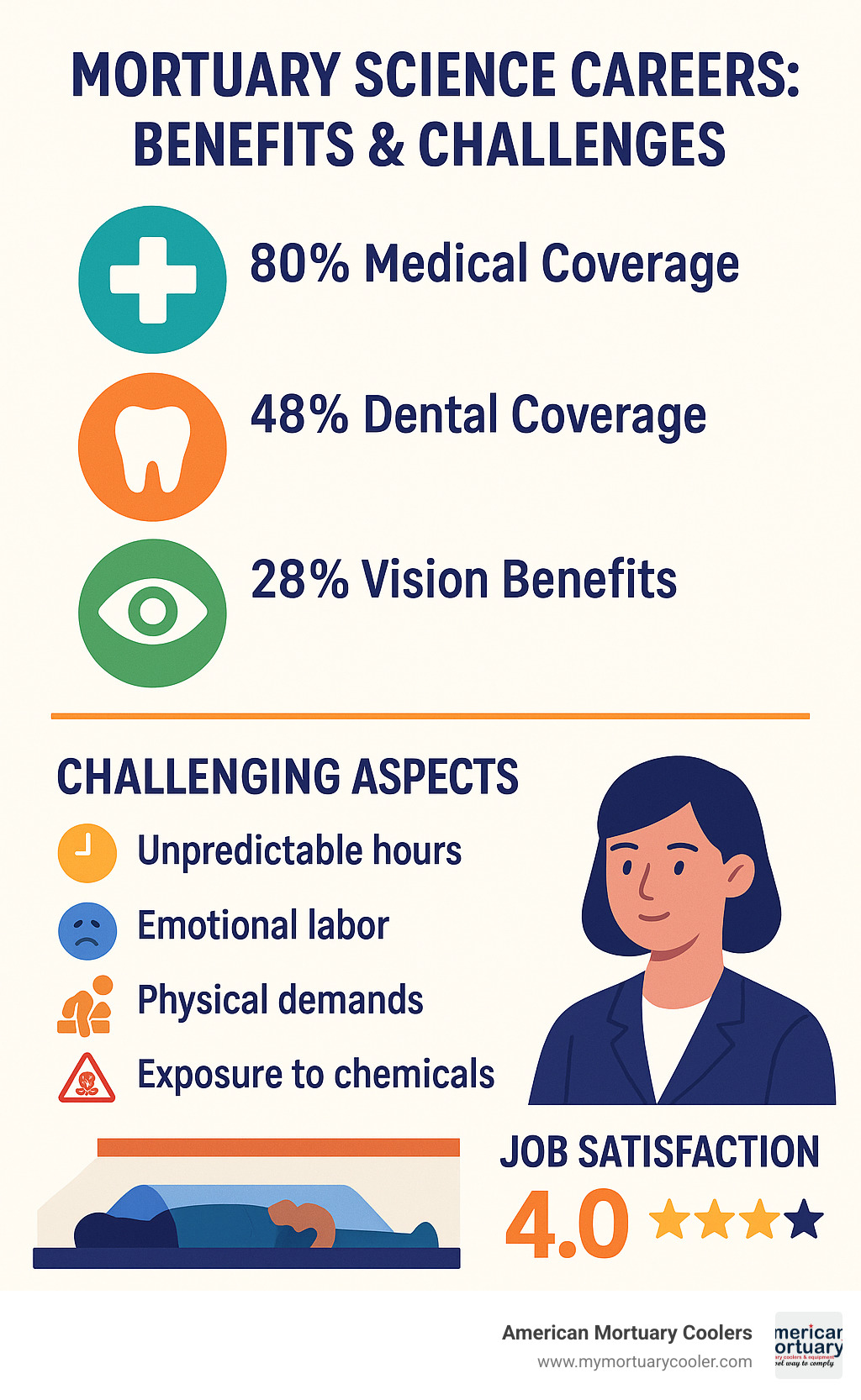
Frequently Asked Questions about Mortuary Science Pay
What entry-level salary can I expect after graduation?
Starting your career in mortuary science brings both rewarding work and practical financial considerations. If you've just earned your associate degree and passed your licensing exams, you can typically expect to earn between $36,000 and $48,000 in your first position.
The average new mortuary professional reports a total compensation package of about $48,796, which includes your base salary plus any small bonuses or commissions you might earn. I've noticed that many of our clients at American Mortuary Coolers mention how important that first job is for building experience, even if the pay isn't quite where they'd like it yet.
Where you work makes a big difference too. Urban funeral homes often offer higher starting wages than rural ones, though your cost of living will be higher too. Many of my colleagues started as mortuary assistants or apprentices, earning in that $36,352 to $51,729 range while learning the ropes from experienced directors.
During your first 1-3 years, consider yourself in the apprenticeship phase. Your mortuary science salary typically grows modestly at about 2-3% per year as you build your technical skills and develop relationships with the families you serve. This period is also when many complete any remaining licensing requirements if they weren't fully licensed at graduation.
Which states pay mortuary professionals the most?
When it comes to geography, your location can significantly impact your paycheck. Connecticut consistently ranks as the highest-paying state for our profession, with mortuary professionals there earning an impressive average of $110,400.
Other states where you'll find more generous compensation include the District of Columbia, California, New York, Massachusetts, and New Jersey. These states typically offer higher mortuary science salary figures that reflect their higher cost of living.
On the flip side, states with more modest salaries include Tennessee (where our company is based), South Carolina, Mississippi, Alabama, and Arkansas. In our work supplying mortuary coolers across the country, we've observed these regional differences firsthand. Our Northeast customers often operate with higher overhead costs—including staff salaries—compared to our Southeast clients.
These differences aren't just about cost of living—they also reflect regional traditions around funeral services, competition levels, and how funeral homes are typically structured in different parts of the country.
Are there significant gender pay gaps in mortuary science?
I wish I could report better news here, but yes, our field does have a troubling gender pay gap. Male graduates typically report earning between $50,000 and $80,000 annually, while female graduates report significantly lower earnings between $36,000 and $62,000.
What makes this particularly concerning is that women now make up the majority of mortuary science professionals—about 72.7% compared to 22.7% male, according to recent industry surveys. Yet despite dominating the field numerically, women aren't seeing equal compensation.
Several factors contribute to this disparity. Historically, leadership positions have been male-dominated, women and men may approach salary negotiations differently, work-life balance considerations sometimes affect hours worked (particularly in a profession with unpredictable on-call requirements), and women remain overrepresented in assistant roles versus owner/director positions.
The good news is that professional associations are increasingly addressing this issue through salary transparency initiatives and mentorship programs. At American Mortuary Coolers, we've seen more women-owned funeral homes emerging across our service areas, which is a positive sign for long-term change in the industry.
While we've made progress in gender representation over the past few decades, we clearly still have significant work to do in ensuring equal pay for equal work in the mortuary science profession.
Conclusion
The mortuary science salary landscape offers a rewarding path for both newcomers and veterans in this essential profession. From entry-level positions starting around $36,000 to experienced professionals earning well into six figures, this field provides not just financial stability but also the deep satisfaction that comes from helping families steer their most difficult moments.
If you're looking to maximize your earning potential in mortuary science, several approaches have proven effective for professionals across the industry. Pursuing education beyond the minimum requirements can boost your salary by 10-15%, while specialized certifications in areas like cremation or grief counseling help you stand out in a competitive market. Your geographic location makes a tremendous difference too – as we've seen, a professional in Connecticut might earn nearly twice what their counterpart makes in Tennessee.
Developing both technical skills (embalming techniques, restorative art) and interpersonal abilities (family counseling, grief support) creates a well-rounded professional package that employers value highly. And don't overlook the importance of exploring different employer types – government positions often offer the highest base salaries, while private practice provides pathways to ownership and profit-sharing.
Women in the field should be particularly mindful of the documented gender pay disparities. Armed with industry salary data and a clear understanding of your value, you can approach negotiations with confidence and help narrow this unfortunate gap.
At American Mortuary Coolers, we've had the privilege of working with funeral professionals at every career stage throughout our service regions. From our Tennessee headquarters to funeral homes across the country, we've witnessed how quality equipment and facilities contribute to professional satisfaction beyond just the numbers on a paycheck. While many general mortuary equipment suppliers offer a wide range of products, our exclusive focus on high-performance coolers allows us to provide specialized solutions that many funeral homes prefer over one-size-fits-all vendors.
The mortuary science profession continues to evolve with changing consumer preferences, technological advances, and demographic shifts. Those who accept these changes while holding fast to the core values of compassion and service excellence find not just financial rewards, but also the profound satisfaction that comes from making a real difference during families' most vulnerable moments.
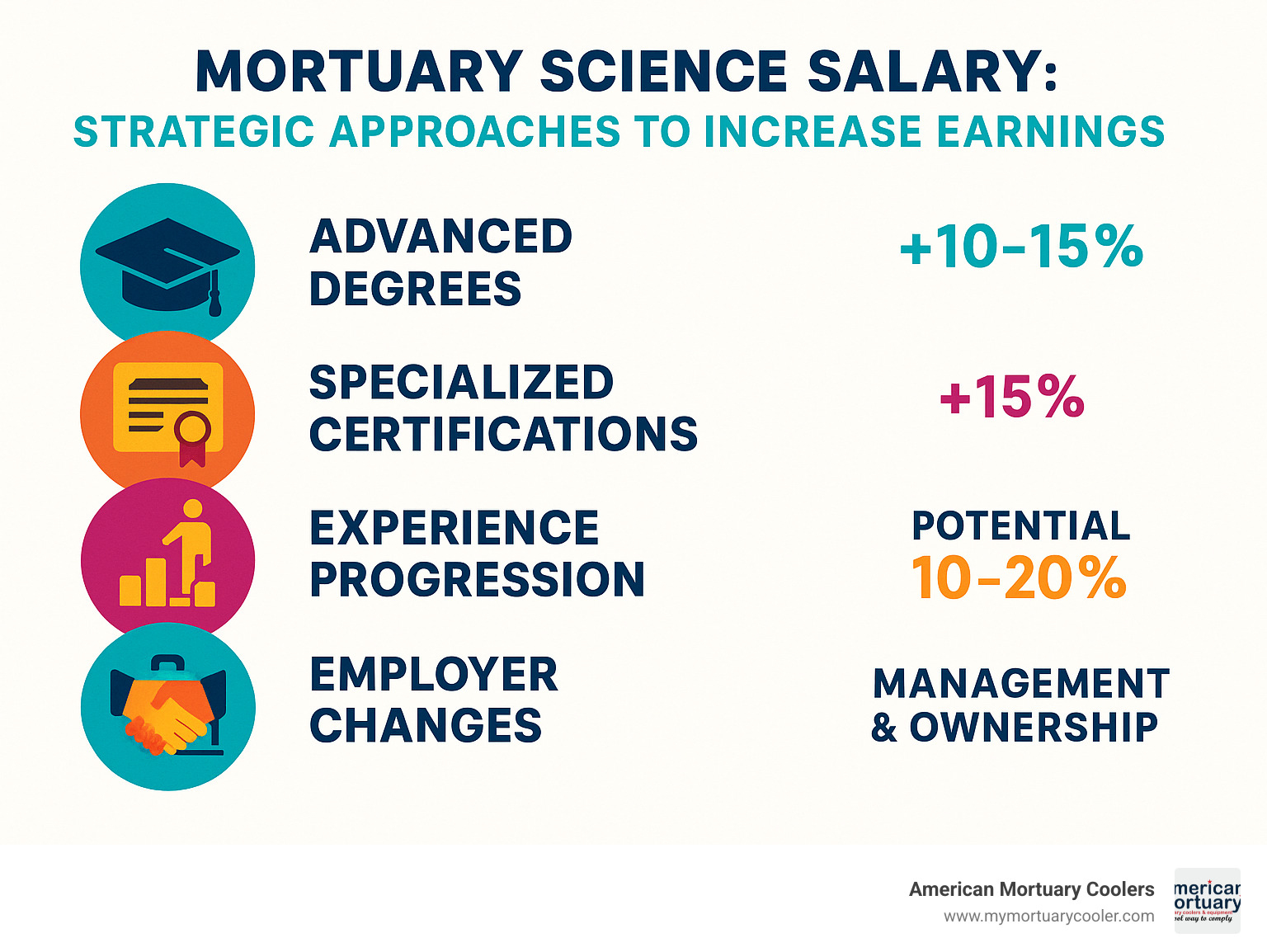
For those interested in learning more about the equipment that supports the mortuary science profession, we invite you to explore more information about quality mortuary coolers that help professionals provide the highest level of care.
















